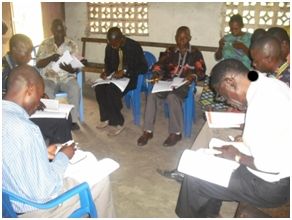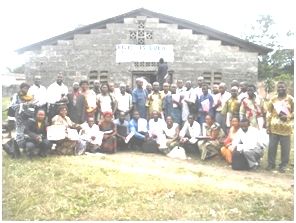How can the church serve its community in order to see positive change?
That question set the framework when 57 participants from eight churches gathered in Idiofa, Democrative Republic of Congo, last June. The event included a Vision Conference and Training of Trainers, all in the effort to multiply wholistic discipleship and “equip God’s people for service in their communities.”

Delegates included pastors and church leaders, as well as staff from NGOs and community development organizations. During the week they planned 11 Seed Projects to “demonstrate God’s concern to their surrounding communities” including:
- Painting the blackboards in several primary schools
- Feeding abandoned children
- Training young mothers in sewing
- Assisting marginalized people
- Building a new source of water
- Training pupils in computer skills
- Cleaning up city streets
- Training widows to manufacture soaps and food items
In addition to the Vision Conference, 34 trainers were equipped “to spread the vision and oversee activities and Seed Projects” planned during the event.
The conference was organized by a local Baptist church, facilitated by Samaritan Strategy, and led by pastors Byamungu and Martin. Idiofa is 660 kilometers east of the capital, Kinshasa.
 Churches represented included: Evangelical, Baptist, Catholic, Presbyterian, New Apostolic, Assemblies of God, Pentecostal Church, and Army chaplaincy. Nine NGOs were also in attendance.
Churches represented included: Evangelical, Baptist, Catholic, Presbyterian, New Apostolic, Assemblies of God, Pentecostal Church, and Army chaplaincy. Nine NGOs were also in attendance.
The importance of the training was expressed by one participant who spoke of the web of lies that enslaves our villages and cities … lies have subjugated our nation. In such a reality, the truth is powerful for tearing down strongholds.
Another delegate related how God’s love erases one of those lies, related to poverty.
God’s love pushes us to take care of others. Many people use their poverty as pretext to hide their selfishness. We always have something to share with the other.
Other testimonites of the impact of the conference spoke of the role of the local church. When all other structures fail, it remains only the church to give hope in the world.
People must see God’s glory through the church. The Christian is a letter written for the world … the salt and light of the world.



